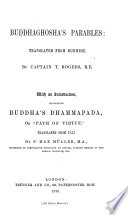 | 1872 - 882 pages
...divine origin of our Bible is derived from a comparison of it with the best parts of the Vedas. 1. " All that we are is the result of what we have thought...pain follows him as the wheel follows the foot of him who draws the cart. 49. "As the bee collects honey and departs without injuring the flower, so... | |
 | 1894 - 1020 pages
...book begins analytically by establishing the kingdom of thought. It lays down the following : — " All that we are is the result of what we have thought...made up of our thoughts. If a man speaks or acts with a pure thought, happiness follows him, like a shadow that never leaves him. " ' He abused me, he beat... | |
 | 1872 - 832 pages
...divine origin of our Bible is derived from a comparison of it with the best parts of the Vedas. 1 . " All that we are is the result of what we have thought...pain follows him as the wheel follows the foot of him who draws the cart. 49. " As the bee collects honey and departs without injuring the flower, go... | |
 | 1883 - 934 pages
...sour, yet, smouldering like fire covered by ashes, it follows the fool " into the unseen world : that if " a man speaks or acts with an evil thought, pain...follows the foot of the ox that draws the carriage," a most significant comparison. As you will remember, we used to read in Hegel, punishment is not something... | |
 | Connecticut. State Board of Agriculture - 1887 - 594 pages
...given a chance to express themselves in actualities. One of the sacred books of the Hindoos says : '-All that we are is the result of what we have thought." The modern school of philosophy teaches that a thought is a thing as substantial as any object we can... | |
 | Friedrich Max Müller - 1870 - 80 pages
...his sayings, written in Pâli — of which I have lately published a translation 2 — we read : i All that we are is the result of what we have thought...pain follows him as the wheel follows the foot of him who draws the cart. 49 As the bee collects honey and departs without injuring the flower, so let... | |
 | Buddhaghosa - 1870 - 412 pages
...batten." See also ' Lalita-vistara,' p. 551, line 1 ; p. 553, line?. CHAPTER I. THE TWIN-VERSES. 1. All that we are is the result of what we have thought...pain follows him, as the wheel follows the foot of him who draws the carriage. (1.) ' Dharma,' though clear in its meaning, is difficult to translate.... | |
 | Buddhaghosa (theologian.) - 1870 - 410 pages
...while Professor "VVeber'a rendering, "Die Pflichten aus dem Herz folgern," is quite inadmissible. 2. All that we are is the result of what we have thought...made up of our thoughts. If a man speaks or acts with a pure thought, happiness follows him, like a shadow that never leaves him. 3. "He abused me, he beat... | |
 | Buddhaghosa - 1870 - 392 pages
...while Professor Weber's rendering, "Die Pflichten aus dem Herz folgern," is quite inadmissible. 2. All that we are is the result of what we have thought:...made up of our thoughts. If a man speaks or acts with a pure thought, happiness follows him, like a shadow that never leaves him. 3. "He abused me, he beat... | |
 | Octavius Brooks Frothingham - 1871 - 690 pages
...and the other ; they would understand that " Virtue can no more be rewarded than joy can ;" that " if a man speaks or acts with an evil thought, pain follows him as the wheel follows the foot of him that draws the carriage." " We desire immortality," said Richter, " not as the reward of virtue... | |
| |